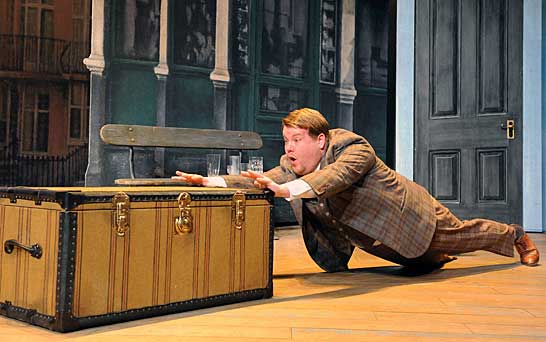Here’s how busy I’ve been: I completely forgot to pass the word that Shakespeare & Company’s production of Satchmo at the Waldorf, my first play, has already been extended! It opens on August 22 in Lenox, Mass., and will now run there until September 16.
For more information, or to order tickets on line, go here.
Archives for April 19, 2012
TT: For Anglophiles only
Due to the crush of Broadway openings this week and next, I’m filing several extra drama columns for The Wall Street Journal. In today’s paper I report on One Man, Two Guvnors and Peter and the Starcatcher, neither of which did much for me. Here’s an excerpt.
* * *
Spring has come to Broadway, and with it the annual big-ticket British import. This year it’s “One Man, Two Guvnors,” Richard Bean’s Anglicized adaptation of “The Servant of Two Masters,” Carlo Goldoni’s classic 1746 comedy. Don’t be deceived by that description, though, because “One Man, Two Guvnors” is not a highbrow show, or even a “Masterpiece Theatre”-style middlebrow costume drama. It’s a lowbrow vaudeville turn in the manner of “The Benny Hill Show,” and part of the fun–if you’re English, anyway–is that this hot, sweaty, moderately bawdy play has been staged by Nicholas Hytner and is being performed by the National Theatre of Great Britain, which has hitherto favored us with such elevated fare as “The History Boys,” “Jumpers,” “The Pillowman,” “The Pitmen Painters” and, most recently, “War Horse.” It might be easier to appreciate the joke, such as it is, if “One Man, Two Guvnors” were funnier, but it’s a decidedly mixed bag, a very long show (two and a half hours) with one brilliant scene that doesn’t compensate for the acres of tedium that surround it.
 The plot, in which a hapless klutz (James Corden) who works for two different bosses (Oliver Chris and Jemima Rooper) gets himself into a world of trouble, need not concern us, since “One Man, Two Guvnors,” is not a plot-driven farce but a pretext for frenzied slapstack and nudge-nudge-wink-wink dialogue (one of the characters is a lawyer from the firm of “Dangle, Berry and Bush”). The play is set in 1963–the year in which, according to Philip Larkin, sexual intercourse began–and is accompanied by the sort-of-Beatleish songs of a four-man pop combo called the Craze. What we have here, in short, is a style of comedy as culture-specific as the lower-middle-class accents assumed by the members of the excellent cast, and one that has never managed to get much of a toehold in America. It’s as if Lincoln Center Theater were to produce a play about Abbott and Costello and send it to the West End….
The plot, in which a hapless klutz (James Corden) who works for two different bosses (Oliver Chris and Jemima Rooper) gets himself into a world of trouble, need not concern us, since “One Man, Two Guvnors,” is not a plot-driven farce but a pretext for frenzied slapstack and nudge-nudge-wink-wink dialogue (one of the characters is a lawyer from the firm of “Dangle, Berry and Bush”). The play is set in 1963–the year in which, according to Philip Larkin, sexual intercourse began–and is accompanied by the sort-of-Beatleish songs of a four-man pop combo called the Craze. What we have here, in short, is a style of comedy as culture-specific as the lower-middle-class accents assumed by the members of the excellent cast, and one that has never managed to get much of a toehold in America. It’s as if Lincoln Center Theater were to produce a play about Abbott and Costello and send it to the West End….
Except for Cathy Rigby, scarcely anybody in America does “Peter Pan” anymore. J.M. Barrie’s 1904 play is almost never produced on this side of the Atlantic, and the 1954 musical-comedy adaptation concocted by Jerome Robbins, which NBC used to telecast at fairly frequent intervals, was last revived on Broadway in 1999 and vanished from TV long before that. For this reason, it seems unlikely that very many under-40 playgoers will know what’s missing from “Peter and the Starcatcher,” Rick Elice’s stage version of the 2006 novel in which Dave Barry (yes, that Dave Barry) and Ridley Pearson contrived to explain how the winsome flying boy who never wanted to grow up got to Neverland in the first place.
If you’ve never seen “Peter Pan,” then you may well find “Peter and the Starcatcher” amusing in its ultra-contemporary way, but Barrie and Robbins were up to something completely different. The real “Peter Pan” is an ode to lost innocence, one whose whimsy barely disguises its underlying pathos. Not so “Peter and the Starcatcher,” which is reminiscent of nothing so much as the reflexively sarcastic animated cartoons on which the millennial generation cut its baby teeth, in which knowing pop-culture references and catchphrases take the place of actual jokes….
* * *
Read the whole thing here.
From the 1960 telecast of Jerome Robbins’ adaptaion of J.M. Barrie’s Peter Pan, Mary Martin sings “Never Never Land,” by Jule Styne, Betty Comden, and Adolph Green:
TT: Almanac
“The historian, essentially, wants more documents than he can really use; the dramatist only wants more liberties than he can really take.”
Henry James, preface to The Aspern Papers
